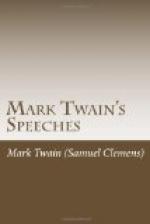but the Pilgrims themselves. So we have struck
an inconsistency here —one says it was
the landing, the other says it was the Pilgrims.
It is an inconsistency characteristic of your intractable
and disputatious tribe, for you never agree about
anything but Boston. Well, then, what do you
want to celebrate those Pilgrims for? They were
a mighty hard lot—you know it. I
grant you, without the slightest unwillingness, that
they were a deal more gentle and merciful and just
than were the people of Europe of that day; I grant
you that they are better than their predecessors.
But what of that?—that is nothing.
People always progress. You are better than
your fathers and grandfathers were (this is the first
time I have ever aimed a measureless slander at the
departed, for I consider such things improper).
Yes, those among you who have not been in the penitentiary,
if such there be, are better than your fathers and
grandfathers were; but is that any sufficient reason,
for getting up annual dinners and celebrating you?
No, by no means—by no means. Well,
I repeat, those Pilgrims were a hard lot. They
took good care of themselves, but they abolished everybody
else’s ancestors. I am a border-ruffian
from the State of Missouri. I am a Connecticut
Yankee by adoption. In me, you have Missouri
morals, Connecticut culture; this, gentlemen, is the
combination which makes the perfect man. But
where are my ancestors? Whom shall I celebrate?
Where shall I find the raw material?
My first American ancestor, gentlemen, was an Indian—an
early Indian. Your ancestors skinned him alive,
and I am an orphan. Not one drop of my blood
flows in that Indian’s veins today. I stand
here, lone and forlorn, without an ancestor.
They skinned him! I do not object to that,
if they needed his fur; but alive, gentlemen-alive!
They skinned him alive—and before company!
That is what rankles. Think how he must have
felt; for he was a sensitive person and easily embarrassed.
If he had been a bird, it would have been all right,
and no violence done to his feelings, because he would
have been considered “dressed.” But
he was not a bird, gentlemen, he was a man, and probably
one of the most undressed men that ever was.
I ask you to put yourselves in his place. I
ask it as a favor; I ask it as a tardy act of justice;
I ask it in the interest of fidelity to the traditions
of your ancestors; I ask it that the world may contemplate,
with vision unobstructed by disguising swallow-tails
and white cravats, the spectacle which the true New
England Society ought to present. Cease to come
to these annual orgies in this hollow modern mockery—the
surplusage of raiment. Come in character; come
in the summer grace, come in the unadorned simplicity,
come in the free and joyous costume which your sainted
ancestors provided for mine.




